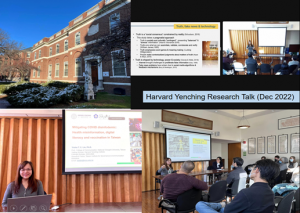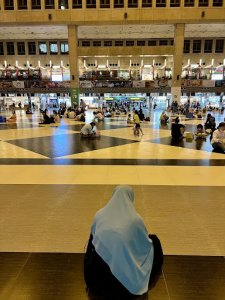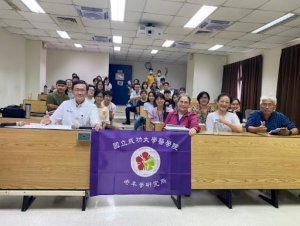In many ways, Taiwan is very familiar to me: I have traveled through most of its cities, have many Taiwanese friends, and have worked here previously as a visiting researcher. I enjoy the sights, sounds, people, places, and most aspects of life here. Of course, there are everyday challenges: finding the best deals on cell phone plans, traveling to more remote areas without Chinese fluency, etc. Overall, however, my greatest challenge in utilizing my Fulbright grant concerns the research itself. During the course of my Fulbright fellowship, I have met hundreds of people from all walks of life, including Taiwanese faculty, students, museum curators, and many, many others. Part of the reason Fulbright is such a wonderful program is that an explicit part of your work here is the opportunity to truly connect with people here, both in a professional and personal capacity. Fulbright opens many doors that would otherwise be closed to you as a visitor or company employee here; so make the best use of this opportunity as possible for your sake, the sake of your Taiwanese colleagues, and the relationship between the USA and Taiwan!
Unlike most other grantees, I specialize in bioengineering for making biofuels, biochemicals, and understanding microbial traits (such as drug resistance) on a genetic level, so I have spent great deal of time and effort trying to make connections with the biotechnology industry in Taiwan. Biotechnology has been targeted for significant investment by the Taiwanese government, including approximately $2 billion USD for biotech investment. One caveat is that biotechnology companies in Taiwan are more focused on biomedical products than in the US, so there are comparatively fewer companies that employ biotechnological routes for producing fuels, chemicals, and pharmaceuticals (besides protein-based therapeutics). Since I was trained as a chemical engineer, my interests naturally gravitate towards large-scale chemical production, while overlapping sufficiently with medically-relevant research to form useful partnerships with Taiwanese biomedical researchers. Collaborators for biomedical research are easier to find, and the research itself is easier to fund as well. With enough persistence, however, any bioengineer can make mutually beneficial connections here.
In this piece, I want to share some of the lessons I have learned during my fellowship about connecting with biotechnology researchers here in Taiwan. These tips are drawn from my experiences and are intended to help you develop reasonable expectations for your time here before arriving. Your fellow grantees are more likely to focus on the social sciences and humanities; given that interdisciplinary contact of this sort is relatively hard to come by, be sure to try to involve them in your research and attend any of their public performances and talks, if possible.
Do: give presentations as often as possible. There are relatively few researchers specializing in my area in Taiwan, so presenting my research in various venues, including lab meetings, invited lectures and small conferences is a great way to explain why my field is important, while taking the opportunity to highlight connections between the audience’s specialization and my own. In some cases, you might be invited for unexpected guest lectures, as was the case when I was invited to present to an audience of electrical engineering undergraduates in Kaohsiung. Every presentation will help raise your visibility as a scholar in Taiwan, increase interest in your research focus (possibly helping you to recruit students in the future) and allow to you underline the benefits of the Fulbright program for the students and faculty in your audience.
Don’t: get discouraged by language barriers. Taiwanese students and professionals are generally quite modest concerning their English abilities. In a technical setting at National Taiwan University, it is actually pretty uncommon for someone to misunderstand vocabulary they could commonly encounter in the course of their research. By and large, you can expect students and certainly faculty members (many of whom have attended US institutions for their graduate studies) to understand the general point of your research without undue difficulty. However, once you step outside this circle of familiarity, you need to avoid overly-specialized terms or use equivalents known to the audience. One key difficulty is that audience members will rarely ask for clarification of points they do not understand (due to technical or language issues), so make sure to speak more slowly and summarize what you are saying using figures or your slides. As long as you avoid talking down to the audience, you’ll be fine; I usually explain concepts in a few different ways throughout my presentations to avoid obvious repetition.
Do: reach out to people through mutual connections. Personal connections such as friends of friends and co-worker contacts can help by introducing you to local researchers in Taiwan. Much like in the USA, unsolicited emails from unknown senders may not elicit responses from the movers and shakers in the Taiwanese biotechnology sector. However, your host professor will certainly know people in their field, and can introduce you to people whom you would like to meet. I was fortunate in that I already knew my host well, having worked with her the year prior. In addition, I had met a bevy of other Taiwanese researchers in the past. I was also able to contact a previous Fulbright grantee in a related field and get in touch with their host at Academia Sinica, one of the premier research institutes in Taiwan. These introductions do not have to be made at formal events; in fact, I recommend going to see these researchers over lunch or coffee to get to know them. You can then learn more about their research interests, their students, and determine what avenues exist for collaboration or assistance.
Don’t: neglect to reach out to industry. My academic field is part of chemical engineering, and thus has a heavy focus on academic-industrial cooperation. In the basic sciences (biology, chemistry, and others), there is generally a sharper divide between the two sectors. Your host may not have a lot of experience with industrial collaboration, so to find industrial researchers here you may need to rely more on Taiwanese professionals with whom you share some connection in the US. If your specialization is biomedical in nature, there are quite a few local companies that specialize in developing novel cancer therapeutics with whom projects could be developed. However, if you focus more on microbial engineering for producing chemicals, such as myself, you will have to search more to find relevant connections. It is helpful to examine publications in your specialization coming from Taiwanese universities to find like-minded researchers, and then ask them if they can help you make contacts in industry.
Do: try to bring hard-to-get research supplies with you. The distribution network of scientific supplies in Taiwan is essentially identical to that of the USA. However, unlike in the USA, nearly all these materials are expensive imports. Routine biological materials such as primers, bulk chemicals, growth media, and others are mostly imported from Japan or the USA, and are therefore substantially more expensive in Taiwan. For the most part, you cannot obtain next-day shipping for most items unless they are stockpiled or produced in Taiwan. However, American researchers that I have known in Taiwan have found ways around these issues.
Don’t: forget that Fulbright is meant to be an exchange. The Fulbright program is meant to be a mutually beneficial exchange of knowledge and friendship. While your Taiwanese hosts are feting as a foreign scholar, do not lose sight of this mission. Being a Fulbright scholar is a great honor, but with it comes the responsibility to constantly look out for opportunities to help students and researchers here connect with researchers in the USA. Often, you can help people find their next position in the US as a PhD students or post-docs, or at least give them some pointers on how to effectively search for opportunities back home.
Do: seek out unusual opportunities. Not only with reference to biological research in Taiwan, the best attitude you can have is: “that sounds interesting, let’s try that!” There are many opportunities for outreach and getting to know people in unexpected quarters. For example, I became involved with a YouTube channel known as Stop Kiddin’ Studio as an actor, helping to make videos concerning scientific research here as well as daily life from the perspective of non-Taiwanese in Taiwan. Essentially, you should seek out and accept opportunities that let you connect with Taiwanese people, help you promote the Fulbright program and offer new and enjoyable experiences. Try to make the best use of your time in Taiwan. Trust me, it goes by quickly!
I wish you the best of luck in your Taiwan adventure. For many fellows, working in Taiwan is a formative experience, and they end up staying in the country for years after the conclusion of their fellowship. Do your best to make a positive impact and enjoy your trip!
1“Biotechnology: Biotechnology Takeoff Action Plan,” Department of Investment Services, Ministry of Economic Affairs, R.O.C. http://investtaiwan.nat.gov.tw/eng/show.jsp?ID=999990 Accessed Jan 10, 2016.
2 不要鬧 https://www.youtube.com/channel/UCBgdVDkSsiPBVop4-Ms0ihQ Accessed Jan 10, 2016.







